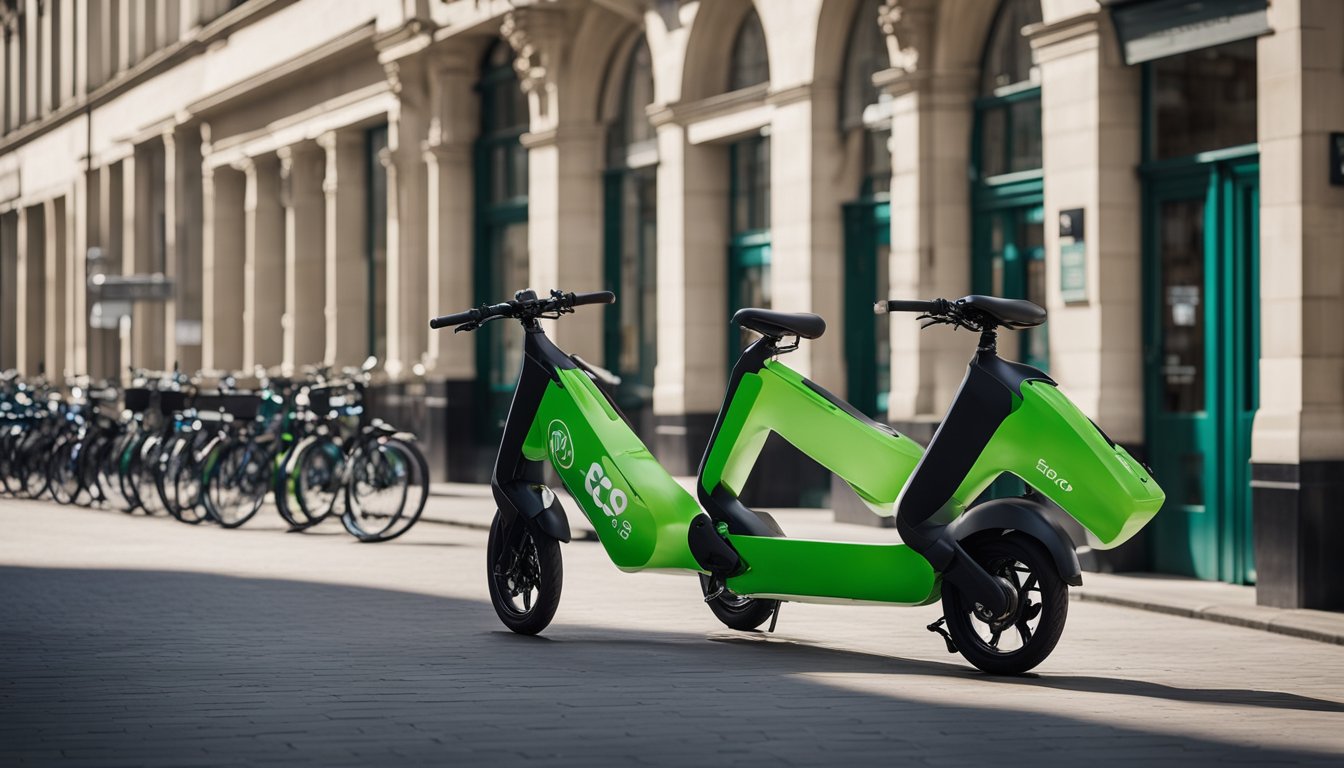Late updated: 01 Jul 2024 11:07
Written by: Amber Collins
Encouraging Green Commuting For UK Businesses: Sustainable Strategies and Benefits
The challenges of climate change and the need for sustainability have never been clearer. As UK businesses look to the future, reducing carbon footprints is essential. Supporting green commuting is a powerful step in the right direction. By encouraging employees to adopt sustainable travel methods, we can make a significant impact on national carbon emissions and help meet the UK's net-zero targets by 2050.

Transport contributes substantially to the UK's carbon emissions, with commuting accounting for a significant portion. Our businesses have a unique role to play in driving forward this change. Making commuting greener isn't just about reducing emissions; it's also about fostering a healthier workforce and demonstrating corporate responsibility.
We face a range of solutions, from incentivising public transport and cycling to implementing remote work policies. These measures not only decrease emissions but can also enhance employee satisfaction and productivity. Let’s explore these strategies and how they can transform our approach to commuting.
Key Takeaways
- Encouraging green commuting can significantly reduce carbon emissions.
- Businesses play a crucial role in promoting sustainable commuting practices.
- Various strategies like public transport incentives and remote work can be effective.
The Imperative of Encouraging Green Commuting in the UK

Adopting green commuting practices in the UK can significantly reduce our collective carbon footprint and combat climate change. Addressing transport emissions is crucial for achieving our environmental goals.
Understanding the Environmental Impact of Commuting
Commuting contributes substantially to greenhouse gas emissions in the UK. Traditionally, petrol and diesel vehicles dominate, leading to higher carbon emissions. Studies indicate that commuter emissions can form a significant portion of a company's scope 3 emissions.
To exemplify, Good Energy found that commuter emissions accounted for 70% of their total carbon footprint in 2017. Reducing these emissions through green commuting, such as cycling, walking, or using electric vehicles, can significantly benefit the environment.
Legislation and Policies: The Role of the UK Government
The UK government plays a vital role in promoting sustainable commuting. Policies aimed at reducing carbon emissions are essential for businesses and individuals.
The UK aims to reach net zero emissions by 2050, necessitating strong legislative support. Initiatives like green vehicle schemes and grants for electric vehicle charging stations encourage businesses to adopt greener practices. Collaboration between the government, employers, and workers can create a more sustainable future for commuting in the UK.
Strategies for Promoting Sustainable Commuting in Businesses
Encouraging sustainable commuting is vital for businesses looking to decrease their carbon footprint and support employee wellbeing. Below are detailed strategies focused on fostering green commuting habits among the workforce.
Developing a Green Commuting Plan
A well-structured green commuting plan starts with clear goals aligned with sustainability targets. We can begin by conducting surveys to understand current commuting habits and identifying areas needing improvement.
Incorporating flexible working arrangements such as remote work or staggered schedules can reduce daily traffic and transport emissions. Partnering with local transport providers can help identify sustainable travel options, such as bus and train services, making commuting more accessible and less reliant on cars.
Incentive Programmes to Encourage Sustainable Travel
Implementing incentive programmes can significantly influence commuting choices. Offering benefits like the Cycle to Work Scheme encourages employees to cycle, promoting both health and environmental benefits. Providing parking subsidies for carpooling or EV charging facilities can also tip the scales towards green alternatives.
Additionally, creating rewards for green travel, such as discounts on public transport passes or vouchers for eco-friendly goods, can foster a culture of sustainability within the organisation.
Investing in Infrastructure and Facilities for Green Commuting
Investing in the right infrastructure supports sustainable travel. Installing secure bike racks and e-bike charging stations encourages cycling. Providing facilities like showers and lockers ensures that employees can freshen up after an active commute.
Creating designated carpool parking spaces and ensuring easy access to EV charging points can further reduce reliance on traditional vehicles. We should also consider partnering with workplace charging schemes for electric vehicles, which can help with cost savings and meet sustainability goals.
Encouraging Active Travel and Reducing Reliance on Cars
Promoting active travel such as walking and cycling offers both health and environmental benefits. Organising walking groups or bike trains can make these options more enticing, while providing incentives like fitness trackers for regular participants can keep motivation high.
To reduce car usage, businesses can implement carpooling schemes or offer subscriptions to green transport options like shared bikes or electric scooters. Flexible working policies, such as remote or hybrid work, also play a crucial role in reducing the need for daily commutes, thereby lowering transport emissions and traffic.
By adopting these strategies, businesses can make significant progress towards promoting sustainable commuting, contributing to both environmental and employee wellbeing goals.
Frequently Asked Questions

Promoting green commuting in UK businesses involves understanding available incentives, integrating sustainable transport, and adhering to relevant regulations.
What incentives can UK businesses offer to promote green commuting among their employees?
UK businesses can offer several incentives to encourage green commuting. Subsidising public transport passes, providing facilities for cyclists, and offering flexible working hours to reduce peak travel times are effective strategies. Financial incentives, such as bonuses or discounts for employees who use environmentally friendly means of transport, also make a significant impact.
How can small UK companies integrate green transportation into their sustainability plans?
Small UK companies can start by assessing their current transportation footprint and identifying areas for improvement. Investing in electric vehicles, securing grants for green initiatives, and partnering with local green transport services are practical steps. Additionally, implementing remote work where feasible can reduce the overall need for commuting.
What are the latest UK regulations promoting sustainable transport in the workplace?
Recent UK regulations include incentives like tax breaks for businesses that invest in green technologies. Grants and subsidies are available for renewable energy projects, including green transportation. The UK government is pushing towards net zero by 2050, encouraging all businesses to adopt sustainable practices to meet these targets, such as the switch to electric vehicles and enhanced public transport options.
In what ways can a UK business measure the impact of green commuting initiatives?
Businesses can measure the impact through regular employee surveys, tracking modes of transport, and calculating travel-related emissions. Tools and software are available to help monitor these metrics. Regular reporting and analysis of this data can provide insights into the effectiveness and areas for improvement in green commuting strategies.
What are the most effective methods for UK businesses to communicate green commuting policies to their staff?
Clear and consistent communication is key. Businesses should use multiple channels, such as emails, intranet postings, and meetings, to inform and update employees about green commuting policies. Visual aids like posters and infographics can also help. An engaged approach, including workshops and Q&A sessions, ensures employees understand and buy into the initiatives.
How can UK businesses collaborate with local authorities to support sustainable commuting?
Businesses can work closely with local councils to improve public transportation infrastructure and facilities for cyclists. Participation in local sustainability forums and networks can help drive community-wide green initiatives. Forming partnerships with local transport providers for discounted rates or shared services further enhances support for sustainable commuting amongst employees.
